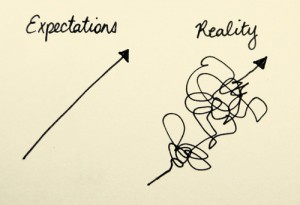My grandfather recently told me the story of a consulting engagement he had in 1972. My grandmother asked him, “What makes you qualified to be a consultant?” His answer? “I charge a lot and I come from out of town!”
After we finished chuckling, I thought about the mindset of hiring an outside professional to come into an organization. Are price and distance really the determining factors?
Price:
I’ve heard from multiple professionals in the industry who say that charging enough is critical as proof of value. The immediate thought when someone sees a low price is to question the value of the service they are getting. (I learned as much as I increased my rates trifold in the first six months).
In addition, people continually underestimate their own expertise. For many industries, there are no number of certifications and letters after your name that will convince a small or medium sized business owner that you are an authority worth hiring. More often, the social proof of referrals, testimonials, case studies, and fit in an organization will be the deciding aspect.
Distance:
When I think distance, what I really hear is ‘outside of the organization’. I have been on both sides of the coin-inside when an outside professional has come in, and outside as the ‘experienced professional’.
In both cases, communication is the key to success. Institutional buy-in, cooperation, and a true desire to teach or learn are the means to accomplishment in the organization. When all parties understand their roles, how the outside presence will affect them, and can see what the path forward looks like, then they can fruitfully move forward under the baseline expectations.
My grandfather also told me he brought an expensive leather briefcase to his gig. He said it was because successful people carried briefcases, and it was a signal that he was for real. Of course, it was completely empty. My advice though, is that you’d better be careful-any professional will be exposed in the long run if their metaphorical briefcase is empty.
Sorry Pop!



